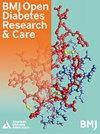Variation in the relationship between fasting glucose and HbA1c: implications for the diagnosis of diabetes in different age and ethnic groups
IF 3.7
2区 医学
Q2 ENDOCRINOLOGY & METABOLISM
引用次数: 0
Abstract
Introduction Identify non-glycemic factors affecting the relationship between fasting plasma glucose (FPG) and glycated hemoglobin (HbA1c), in order to refine diabetes diagnostic criteria. Research design and methods Relationship between FPG–HbA1c was assessed in 12 531 individuals from 2001 to 2018 US National Health and Nutrition Examination Survey. Using a recently described method, FPG and HbA1c were used to calculate apparent glycation ratio (AGR) of red blood cells for different subgroups based on age, race, and gender. Results At an FPG of 7 mmol/L, black individuals had a higher HbA1c (p<0.001, mean: 50.2 mmol/mol, 95% CI (49.8 to 50.4)) compared with white individuals (47.4 mmol/mol (47.2 to 47.5)). This corresponds to NGSP (National Glycohemoglobin Standardization Program) units of 6.7% and 6.5% for black versus white individuals, respectively. Similarly, individuals under 21 years had lower HbA1c (p<0.001, 47.9 mmol/mol (47.7 to 48.1), 6.5%) compared with those over 50 years (48.3 mmol/mol (48.2 to 48.5), 6.6%). Differences were also observed between women (p<0.001, 49.2 mmol/mol (49.1 to 49.3), 6.7%) and men (47.0 mmol/mol (46.8 to 47.1), 6.5%). Of note, the difference in HbA1c at FPG of 7 mmol/L in black females over 50 and white males under 21 years was 5 mmol/mol (0.46%). AGR differences according to race (p<0.001), age (p<0.001), and gender (p<0.001) explained altered glucose–HbA1c relationship in the analyzed groups. Conclusions FPG–HbA1c relationship is affected by non-glycemic factors leading to incorrect diagnosis of diabetes in some individuals and ethnic groups. Assessment of AGR helps understand individual-specific relationship between glucose levels and HbA1c, which has the potential to more accurately diagnose and manage diabetes. Data are available in a public, open access repository. Data were compiled from the National Health and Nutrition Examination Survey (NHANES) cohorts, between the period of 2001 and 2018 which are publicly available on the US Centers for Disease and Control website.空腹血糖与 HbA1c 之间关系的差异:对不同年龄和种族群体糖尿病诊断的影响
导言 找出影响空腹血浆葡萄糖(FPG)和糖化血红蛋白(HbA1c)之间关系的非血糖因素,以完善糖尿病诊断标准。研究设计与方法 对 2001 年至 2018 年美国国家健康与营养调查中的 12 531 人进行了空腹血浆葡萄糖与糖化血红蛋白之间关系的评估。使用最近描述的方法,根据年龄、种族和性别,使用 FPG 和 HbA1c 计算不同亚组的红细胞表观糖化比(AGR)。结果 当 FPG 为 7 mmol/L 时,黑人的 HbA1c 较高(p<0.001,平均值为 50.2 mmol/mol,平均值为 50.2 mmol/mol):与白人(47.4 mmol/mol (47.2 to 47.5))相比,黑人的 HbA1c 更高(p<0.001,平均值:50.2 mmol/mol,95% CI (49.8 to 50.4))。这相当于国家糖化血红蛋白标准化计划(NGSP)的单位,黑人与白人分别为 6.7% 和 6.5%。同样,与 50 岁以上人群(48.3 mmol/mol(48.2-48.5),6.6%)相比,21 岁以下人群的 HbA1c 更低(p<0.001,47.9 mmol/mol(47.7-48.1),6.5%)。女性(P<0.001,49.2 mmol/mol(49.1 至 49.3),6.7%)和男性(47.0 mmol/mol(46.8 至 47.1),6.5%)之间也存在差异。值得注意的是,50 岁以上的黑人女性和 21 岁以下的白人男性在 FPG 为 7 mmol/L 时的 HbA1c 差异为 5 mmol/mol(0.46%)。种族(p<0.001)、年龄(p<0.001)和性别(p<0.001)的 AGR 差异解释了分析组中葡萄糖与 HbA1c 关系的改变。结论 FPG-HbA1c 关系受到非血糖因素的影响,导致某些个体和种族群体被误诊为糖尿病。评估 AGR 有助于了解血糖水平和 HbA1c 之间的个体特异性关系,从而有可能更准确地诊断和管理糖尿病。数据可在公开、开放的资源库中获取。数据来自美国国家健康与营养调查(NHANES)队列,时间跨度为 2001 年至 2018 年,可在美国疾病与控制中心网站上公开获取。
本文章由计算机程序翻译,如有差异,请以英文原文为准。
求助全文
约1分钟内获得全文
求助全文
来源期刊

BMJ Open Diabetes Research & Care
Medicine-Endocrinology, Diabetes and Metabolism
CiteScore
9.30
自引率
2.40%
发文量
123
审稿时长
18 weeks
期刊介绍:
BMJ Open Diabetes Research & Care is an open access journal committed to publishing high-quality, basic and clinical research articles regarding type 1 and type 2 diabetes, and associated complications. Only original content will be accepted, and submissions are subject to rigorous peer review to ensure the publication of
high-quality — and evidence-based — original research articles.
 求助内容:
求助内容: 应助结果提醒方式:
应助结果提醒方式:


